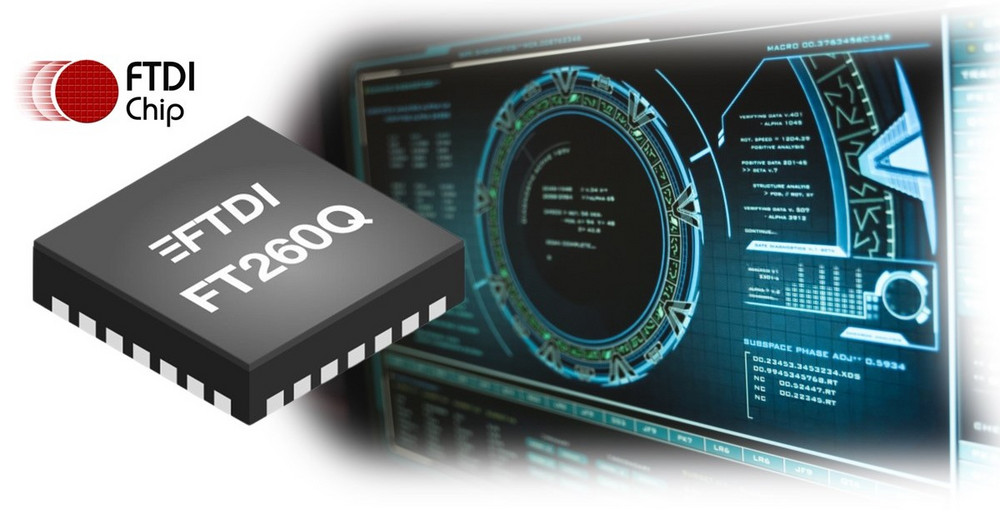
This IC employ standard class drivers, which means it is not necessary to worry about installing vendor-specific drivers. FT260 has dual HID interface support, with I2C and UART bus conversion capabilities. Its flexible IOs is compatible with 1.8V to 3.3V systems. During full operation only 24mA of current is drawn and this drops to just 385µA when in suspend mode.
FT260
The FT260 is the first device of its kind to be compliant with the HID-over-I2C protocol, as specified by Microsoft with the release of Windows 8. A total of 4 different speed modes can be utilized while in I2C bus - standard mode (SM, 100kHz), fast mode ((FM, 400kHz), fast mode plus (FM+, 1MHz) and high speed (HS, 3,4MHz) with 7-bit addressing supported.
The integrated memory resource enables storage of customized USB descriptors. For further customization demand, an EEPROM is required in the application. The built-in oscillator PLL dispenses with the need for an external crystal - thereby saving space and lowering bill of materials costs. Furthermore, unlike competing ICs, the FT260 has USB battery charger detection mechanism included, so that more efficient charging may be benefitted from. It is supplied in compact 28-pin QFN and 28-pin SSOP (coming soon) package options.

• Single chip USB to UART/I2C, UART bridge with standard Human Interface Device (HID) class support
• Support 2 USB HID Interfaces, one for I2C second for UART
• Pin selectable interfaces – I2C, UART or both simultaneously
• Option to access the device directly with HID class report on the most OS or via a Windows dedicated library to simplify the programming API
• USB Battery Charger Detection – great for portable/battery operated devices.
• USB2.0 compliant Full Speed device with entire USB protocol handled on the chip.
• UHCI / OHCI / EHCI / XHCI host controller compatible.
• Fully integrated oscillator PLL with no external crystal required
• Configurable I2C Master Interface controller conforming to I2C v2.1 and v3.0 specification.
• Support 4 speed modes defined in I2C-bus Specification, standard mode (SM), fast mode (FM), Fast mode plus (FM+), and High Speed mode (HS)
• Robust FTDI UART controller with hardware and software flow control. Data transfer rate from 1.2 Kbaud to 12 Mbaud (RS422, RS485, and RS232) at TTL levels.
• Configurable GPIOs can be easily controlled by software applications under HID class via the USB bus
• On-chip eFUSE for USB Vendor ID (VID), Product ID (PID), and other vendor specific parameters. For further customization demand, an I2C EEPROM is required in the application
• +5V USB VBUS detection engine
• USB Power Configurations; supports bus-powered and self-powered.
• USB2.0 low typical operating and suspend current; 24mA (active) and 385µA (suspend).
• True 3.3V CMOS drive output (operates down to 1V8 with external pull-ups) and TTL input.
• Multiple I/O operating voltage level +3.3V, +2.5V, +1.8V
• Pin output drive strength; 4 mA, 8mA, 12mA and 16 mA
• Integrated power-on-reset circuit.
• Extended operating temperature range; -40 to 85°C.
• Available in compact Pb-free (RoHS compliant) 28 Pin QFN and SSOP (coming soon) packages.
• Development module UMFT260EV (coming soon) will aid test and development of the solution.
Are you interested in more information about FTDI or technical support when choosing a product? Or do you have another question or request? Please fill out the following form, we will be happy to help you.
Do you like our articles? Do not miss any of them! You do not have to worry about anything, we will arrange delivery to you.
Competition with the following question has been published here:
How do you configure FT260 to use only I2C interface?



